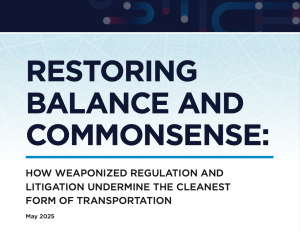Intercity Buses and the Clean Air Act
Idling laws disproportionately harm small- and mid-sized private bus operators—here’s a recommended legislative solution.
American Bus Association Foundation (ABAF) explores how anti-idling programs under the Clean Air Act present significant safety risks for motorcoach operations. The organization offers a legislative recommendation to protect bus companies from unnecessary and burdensome enforcement mechanisms.
Legislative Solutions to Protect Bus Companies and the Clean Air Act
Executive Summary
- About the White Paper: This white paper outlines how current enforcement practices undermine the intent of the Clean Air Act (CAA), punish the cleanest mode of transportation, and jeopardize essential services. It presents a commonsense recommendation for a legislative solution that maintains environmental protections while restoring regulatory balance.
- Key Highlights:
- According to the American Bus Association Foundation (ABAF) and a comprehensive study by the Texas A&M Transportation Institute (TTI), the motorcoach industry offers unparalleled environmental and social benefits:
- Motorcoaches emit just 53 grams of CO2 per passenger-mile—the lowest among all transportation modes, including cars, trains, planes, and ferries.
- Energy efficiency is highest for motorcoaches, with an average of 195.3 passenger-miles per gallon of diesel equivalent (DGE).
- In 2023 alone, motorcoach travel displaced emissions and costs equivalent to $2.7 billion in avoided environmental and health-related damage.
- Virtually every U.S. state and many municipalities have enacted anti-idling laws that restrict engine idling to periods of three to five minutes. While well-intentioned, these rules are increasingly used as tools of litigation against bus companies, especially when embedded in State Implementation Plans (SIPs).
- The Clean Air Act (42 U.S.C. § 7604) allows private citizens and advocacy groups to sue for violations of these SIP-based restrictions. The penalties are severe: up to $121,275 per violation per day, plus attorney and expert witness fees.
- One of the most prominent litigators in this space, the Conservation Law Foundation (CLF), has brought multiple lawsuits against intercity carriers, including Greyhound, Peter Pan, Dattco, and Academy Bus, since 2019.
- These lawsuits often target brief stops and layovers at terminals where idling is necessary for passenger comfort or vehicle readiness.
- Anti-idling programs present significant safety risks for motorcoach operations, which differ fundamentally from those of freight trucks. Motorcoaches transport passengers—not goods— and rely on air-operated systems critical to vehicle safety and functionality.
- These systems include the air brake systems, door operation, luggage bay locks, and kneeling systems, all of which require the engine to be running in a stationary position to generate and maintain sufficient air pressure.
- Additionally, most Americans with Disabilities Act (ADA) compliant wheelchair lifts and ramps require electrical or hydraulic power, which comes from the engine-driven alternator or hydraulic system. Operation of these functions requires the engine to be running for sufficient power and safety.
- According to the American Bus Association Foundation (ABAF) and a comprehensive study by the Texas A&M Transportation Institute (TTI), the motorcoach industry offers unparalleled environmental and social benefits:
Proposed Legislation
- The ABA proposes two modest changes in the CAA to help protect bus companies from unnecessary and burdensome enforcement mechanisms that do not align with the spirit or goals of current law.
- New Section 7604a – Protecting Bus Operators from Federal Lawsuits Based on Idling
- This provision would eliminate the weaponization of lawsuits around bus idling, which has grown into a cottage industry and has needlessly incentivized burdensome and unjustified litigation. It ensures the Clean Air Act cannot be misapplied to punish the cleanest mode of public transportation for minor, non-harmful infractions.
- New Paragraph 42 U.S.C. § 7410(a)(7) – Uniform 15-Minute Standard for Bus Idling
- This provision would set a uniform federal baseline and eliminate enforcement for short stops under 15 minutes, which constitute the vast majority of current citations. It reflects operational realities while preserving reasonable environmental protections.
- New Section 7604a – Protecting Bus Operators from Federal Lawsuits Based on Idling
Citation
- How to Cite This Report: American Bus Association. (2025). Restoring Balance and Commonsense: How Weaponized Regulation And Litigation Undermine The Cleanest Form of Transportation. Retrieved from URL.
- Report Author and Sponsor: American Bus Association and American Bus Association Foundation.
- Contact information: For inquiries, email research@buses.org or call (202) 218-7227.

